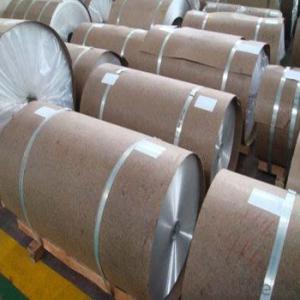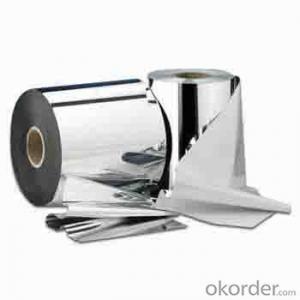Aluminum Direct Casting DC Coils and Rolls
- Loading Port:
- Shanghai
- Payment Terms:
- TT or LC
- Min Order Qty:
- 50 m.t.
- Supply Capability:
- 50000 m.t./month
OKorder Service Pledge
OKorder Financial Service
You Might Also Like
1.Specification
ALUMINIUM COIL
ALLOY: AA1***
AA3***
AA5***
TEMPER: H14 H16 H18 H22 H24 H26 H32 O/F
THICKNESS:0.03MM-3.0MM
WIDTH: 30MM-1700MM
COATING: PE(POLYESTER),PVDF,EPOXY
STANDARD: GB/T 17748-1999
2.Description
In Europe aluminium experiences high rates of recycling, ranging from 42% of beverage cans, 85% of
construction materials and 95% of transport vehicles.Recycled aluminium is known as secondary aluminium, but maintains the same physical properties as primary aluminium. Secondary aluminium is produced in a wide range of formats and is employed in 80% of alloy injections. Another important use is for extrusion.
White dross from primary aluminium production and from secondary recycling operations still contains useful quantities of aluminium that can be extracted industrially.The process produces aluminium billets, together with a highly complex waste material. This waste is difficult to manage. It reacts with water, releasing a mixture of gases (including, among others, hydrogen, acetylene, and ammonia), which spontaneously ignites on contact with air;contact with damp air results in the release of copious quantities of ammonia
gas. Despite these difficulties, the waste has found use as a filler in asphalt and concrete.
3.Why you can choose us?
We can promise the best quality and price!
4.Pictures
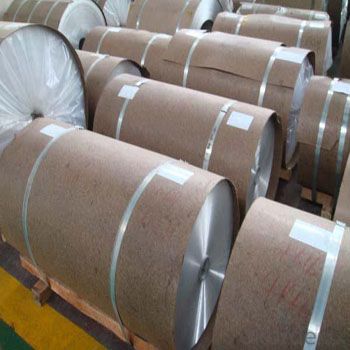
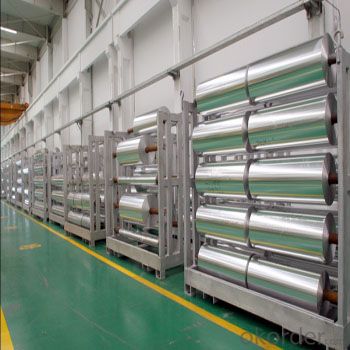
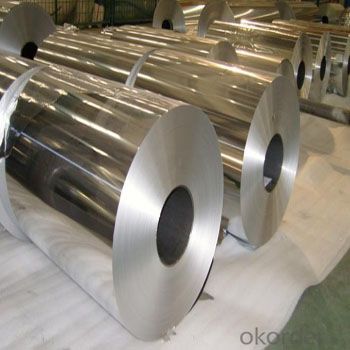
5.FAQ:
1)what is aluminum?
Aluminium (or aluminum; see spelling differences) is a chemical element in the boron group with symbol Al and atomic number 13. It is a silvery white, soft, nonmagnetic, ductile metal. Aluminium is the third most abundant element (after oxygen and silicon), and the most abundant metal in the Earth's crust. It makes up about 8% by weight of the Earth's solid surface.
Aluminium metal is so chemically reactive that native specimens are rare and limited to extreme reducing environments. Instead, it is found combined in over 270 different minerals.The chief ore of aluminium is bauxite.
2)What's kind of payment term we can supply?
CIF,CFR, FOB and other.
3)Can we supply samples?
Yes, we can!
- Q:Are aluminum coils suitable for heat sinks?
- Indeed, aluminum coils are well-suited for heat sinks. The reason for aluminum's popularity in this regard lies in its exceptional thermal conductivity and affordability. Its remarkable thermal conductivity permits efficient heat transfer from a heat source to the heat sink's fins, which effectively dissipate the heat into the surrounding environment. Moreover, aluminum possesses the advantageous qualities of being lightweight and easily moldable into different shapes, thereby rendering it a versatile material for heat sink purposes. All in all, aluminum coils prove to be a fitting option for heat sinks due to their ability to effectively dissipate heat and their cost-effectiveness.
- Q:What are the common safety precautions when working with aluminum coils?
- Some common safety precautions when working with aluminum coils include wearing personal protective equipment such as gloves, safety glasses, and appropriate clothing to protect against cuts and burns. It is important to handle the coils with care to prevent injury, as they can be heavy and have sharp edges. Additionally, workers should be cautious when operating machinery or tools around the coils to avoid accidents. Proper ventilation should be ensured in the work area to prevent the buildup of fumes or dust. Lastly, workers should be trained on proper lifting techniques and be aware of the potential hazards associated with working with aluminum coils.
- Q:How do aluminum coils compare to other metals in terms of strength?
- Aluminum coils generally have lower strength compared to other metals such as steel or titanium. While aluminum is lightweight and offers good corrosion resistance, it may not possess the same level of strength and durability as some other metals. However, the specific strength of aluminum coils can vary depending on the alloy composition and manufacturing process.
- Q:What are the different coil cutting options for aluminum coils?
- There are several coil cutting options available for aluminum coils, depending on the specific needs and requirements of the project. Some of the common coil cutting options for aluminum coils include: 1. Shearing: Shearing is a process that involves cutting aluminum coils using a shear blade. This method is used for straight cuts and is suitable for thinner gauges of aluminum coils. 2. Slitting: Slitting is a process that involves cutting aluminum coils into narrower strips. The coil is passed through a series of rotating circular blades, which cut it into multiple smaller coils of desired widths. Slitting is commonly used to produce coils for various applications such as roofing, automotive, and packaging industries. 3. Cut-to-Length: In this method, the aluminum coil is cut into individual sheets of desired lengths. The coil is first uncoiled, then passed through a leveling machine to remove any coil set or shape defects, and finally, cut into sheets using a flying shear or a stationary shear. Cut-to-length cutting option is commonly used for applications where precise sheet lengths are required. 4. Laser Cutting: Laser cutting is a highly precise and efficient method for cutting aluminum coils. It involves using a high-powered laser beam to melt and vaporize the metal, resulting in clean and accurate cuts. Laser cutting offers the advantage of cutting complex shapes and patterns and is commonly used in the aerospace and electronics industries. 5. Waterjet Cutting: Waterjet cutting is another precise cutting option for aluminum coils. It involves using a high-pressure jet of water mixed with an abrasive material to cut through the coils. Waterjet cutting is particularly suitable for cutting thicker gauges of aluminum coils and offers the advantage of no heat-affected zones or material distortion. These are some of the different coil cutting options available for aluminum coils. The choice of cutting method depends on factors such as the desired end product, required precision, material thickness, and production volume. It is essential to consider the specific requirements of the project to determine the most suitable cutting option.
- Q:I'm wondering if there is a resin/molding material that can withstand the heat of melted aluminum for casting parts. I know that sand casting is the 'norm' but is there anything else? I'd rather not have to pack sand every time I want to cast a part.Thanks!
- One common mold material for metal casting is plaster mixed with silica sand to give it more strength. It needs to be completely (like heated) dry before you use it, but it is actually more work than sand casting but it gives a better finish. There are some rubber materials which can withstand the heat of casting pewter, but the melting point of pewter is so much lower than aluminum that I am sure those won't work for aluminum. I think you are pretty much stuck with sand for the easiest method.
- Q:How are aluminum coils used in the production of food processing equipment?
- Aluminum coils are commonly used in the production of food processing equipment due to their excellent thermal conductivity, corrosion resistance, and lightweight nature. These coils are often formed into various shapes and sizes to create components like heat exchangers, evaporators, and condensers that help regulate temperature during food processing. Additionally, aluminum coils can be easily cleaned and sanitized, making them ideal for use in the food industry where hygiene is crucial.
- Q:Can aluminum coils be used in high-humidity environments?
- Indeed, high-humidity environments can accommodate the use of aluminum coils. Due to its corrosion-resistant nature, aluminum proves to be a fitting material for areas with elevated humidity levels. The formation of a natural oxide layer on the aluminum surface acts as a safeguard against moisture, effectively warding off rust and corrosion. Hence, aluminum coils are widely favored for HVAC systems, as they encounter regular exposure to moisture and humidity. Moreover, the lightweight, durable, and exceptional heat transfer properties of aluminum coils render them an optimum selection for a multitude of industrial and commercial applications in high-humidity settings.
- Q:What is the average lifespan of aluminum coils?
- The lifespan of aluminum coils can differ based on a range of factors, including the quality of the aluminum, the environmental conditions they are subjected to, and the level of maintenance they receive. On average, aluminum coils typically endure for approximately 15 to 20 years. However, by implementing proper installation procedures, conducting regular cleaning, and performing maintenance tasks, the lifespan of aluminum coils can be extended further. It is vital to emphasize the significance of regular inspections and upkeep in order to enhance the longevity of aluminum coils and guarantee optimal performance.
- Q:Can aluminum coils be used for pharmaceutical packaging?
- Certainly, pharmaceutical packaging can make use of aluminum coils. Aluminum is widely preferred for such purposes owing to its numerous advantageous properties. Notably, its lightweight nature, resistance to corrosion, and exceptional barrier properties render it exceptionally suitable for safeguarding pharmaceutical items against external elements like moisture, oxygen, and light. Moreover, aluminum coils can be conveniently fashioned into various shapes and sizes, thereby offering flexibility to meet diverse packaging requirements. It is also worth mentioning that aluminum is both non-toxic and non-reactive, thereby guaranteeing the safety and overall quality of pharmaceutical products.
- Q:I have a mig welder, and I would like to learn to weld aluminum. I have been told that I must buy an aluminum wire spool gun, because the standard mig wire feeder gun will not work with aluminum wire. I don't understand why my standard wire feeder will not work. It feeds wire just like a spool gun. Why do I need to spend money on a spool gun just to weld aluminum? If a spool gun is truly necessary, where can i find one for a reasonable price? Thanks for your help!
- NO okorder /
1. Manufacturer Overview |
|
|---|---|
| Location | |
| Year Established | |
| Annual Output Value | |
| Main Markets | |
| Company Certifications | |
2. Manufacturer Certificates |
|
|---|---|
| a) Certification Name | |
| Range | |
| Reference | |
| Validity Period | |
3. Manufacturer Capability |
|
|---|---|
| a)Trade Capacity | |
| Nearest Port | |
| Export Percentage | |
| No.of Employees in Trade Department | |
| Language Spoken: | |
| b)Factory Information | |
| Factory Size: | |
| No. of Production Lines | |
| Contract Manufacturing | |
| Product Price Range | |
Send your message to us
Aluminum Direct Casting DC Coils and Rolls
- Loading Port:
- Shanghai
- Payment Terms:
- TT or LC
- Min Order Qty:
- 50 m.t.
- Supply Capability:
- 50000 m.t./month
OKorder Service Pledge
OKorder Financial Service
Similar products
New products
Hot products
Related keywords
